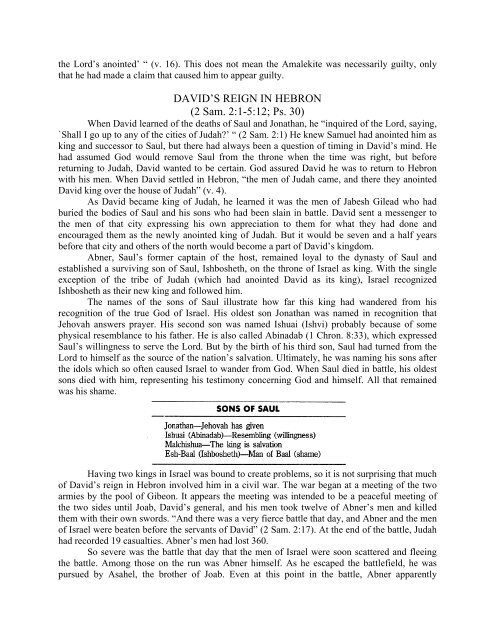A Journey Through The Old Testament - Elmer Towns
A Journey Through The Old Testament - Elmer Towns
A Journey Through The Old Testament - Elmer Towns
You also want an ePaper? Increase the reach of your titles
YUMPU automatically turns print PDFs into web optimized ePapers that Google loves.
the Lord’s anointed’ “ (v. 16). This does not mean the Amalekite was necessarily guilty, only<br />
that he had made a claim that caused him to appear guilty.<br />
DAVID’S REIGN IN HEBRON<br />
(2 Sam. 2:1-5:12; Ps. 30)<br />
When David learned of the deaths of Saul and Jonathan, he “inquired of the Lord, saying,<br />
`Shall I go up to any of the cities of Judah?’ “ (2 Sam. 2:1) He knew Samuel had anointed him as<br />
king and successor to Saul, but there had always been a question of timing in David’s mind. He<br />
had assumed God would remove Saul from the throne when the time was right, but before<br />
returning to Judah, David wanted to be certain. God assured David he was to return to Hebron<br />
with his men. When David settled in Hebron, “the men of Judah came, and there they anointed<br />
David king over the house of Judah” (v. 4).<br />
As David became king of Judah, he learned it was the men of Jabesh Gilead who had<br />
buried the bodies of Saul and his sons who had been slain in battle. David sent a messenger to<br />
the men of that city expressing his own appreciation to them for what they had done and<br />
encouraged them as the newly anointed king of Judah. But it would be seven and a half years<br />
before that city and others of the north would become a part of David’s kingdom.<br />
Abner, Saul’s former captain of the host, remained loyal to the dynasty of Saul and<br />
established a surviving son of Saul, Ishbosheth, on the throne of Israel as king. With the single<br />
exception of the tribe of Judah (which had anointed David as its king), Israel recognized<br />
Ishbosheth as their new king and followed him.<br />
<strong>The</strong> names of the sons of Saul illustrate how far this king had wandered from his<br />
recognition of the true God of Israel. His oldest son Jonathan was named in recognition that<br />
Jehovah answers prayer. His second son was named Ishuai (Ishvi) probably because of some<br />
physical resemblance to his father. He is also called Abinadab (1 Chron. 8:33), which expressed<br />
Saul’s willingness to serve the Lord. But by the birth of his third son, Saul had turned from the<br />
Lord to himself as the source of the nation’s salvation. Ultimately, he was naming his sons after<br />
the idols which so often caused Israel to wander from God. When Saul died in battle, his oldest<br />
sons died with him, representing his testimony concerning God and himself. All that remained<br />
was his shame.<br />
Having two kings in Israel was bound to create problems, so it is not surprising that much<br />
of David’s reign in Hebron involved him in a civil war. <strong>The</strong> war began at a meeting of the two<br />
armies by the pool of Gibeon. It appears the meeting was intended to be a peaceful meeting of<br />
the two sides until Joab, David’s general, and his men took twelve of Abner’s men and killed<br />
them with their own swords. “And there was a very fierce battle that day, and Abner and the men<br />
of Israel were beaten before the servants of David” (2 Sam. 2:17). At the end of the battle, Judah<br />
had recorded 19 casualties. Abner’s men had lost 360.<br />
So severe was the battle that day that the men of Israel were soon scattered and fleeing<br />
the battle. Among those on the run was Abner himself. As he escaped the battlefield, he was<br />
pursued by Asahel, the brother of Joab. Even at this point in the battle, Abner apparently
















